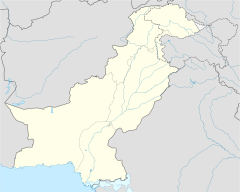Korey Koot
This article does not cite any sources. (August 2013) |
Korey Kot
Korey Kotکوڑے کوٹ | |
|---|---|
| Korey Kot | |
 Korey Kot Location in Pakistan | |
| Coordinates: 32°11′18″N 73°01′43″E / 32.18833°N 73.02861°ECoordinates: 32°11′18″N 73°01′43″E / 32.18833°N 73.02861°E | |
| Country | Pakistan |
| Province | Punjab |
| District | Sargodha |
Korey Kot is a village of Pakistan in district Sargodha near Tehsil . Its population is about ten thousand. Korey and Koot were two ancient tribes who lived in this village centuries ago. Legend has it that the village was inundated by river Chenab as it used to flow by the village then. The ancestors of village came from village naseerpur a settlement existing since 1150AD. The first settlement is reported to be executed by Ch. Dhan Muhammad Ranjha son of Ch. Jiva Khan (great-grandfather of Brigadier Muzaffar Ali Ranjha). Later he invited all people from subtribe to settle here. He specially brought in Tarars and Mumnanas being his friendly people and settle them as his ardent supporters. The lands of this village were allotted to Ranjha tribe around 1821 with courtesy of Ch. Hassan Ranjha from Bhai Khanana subtribe who then became numberdar as well, because of sharp personal traits and links in court in Jammu.
Ranjha رانجھا, Tarars, Dahar ڈار, Haral, and Gondal are the main tribes but Ranjha is the dominant and most numerous landowning tribe in the village. Village Has A Famous Volleyball Player Muhammad Idrees Dahar Captain Of Shaheen Club Korrey Koot, Village has a number of educated people who are serving the nation as Army Officers, Teachers, Lawyers, Bureaucrats and progressive farmers etc. The village remained off much recognition and development but with rise of its sons of soil, namely Brigadier Muzaffari Ali Fanjha and his maternal cousin Aman Ullah Ranjha. The village has seen massive transformation mostly in agriculture and infrastructural projects and is now considered one of best developed villages served with five roads, rural hospital, boys high school, girls middle school (courtesy Brigadier Ranjha ex dg. anti-corruption Punjab). Korey Kot has fertile land and is well known for its Kinno (a type of orange) production. Majority of the population belongs to Sunni Muslim sect. Though this village has a large number of educated people yet they are still engaged in medieval-era-like turf wars but situation is improving on fast rate due to heavy investment by people in education of their children . Demographically, the village comprises three major social classes, i.e. landowning class, landless peasants and Kamwalas ---- those who do minor jobs. In fact, this village is a microcosm of the wider class based Pakistani culture. Moreover, shrine of Baba Shah Manzoor, a famous mystic who is said to have gone under the earth alive along with a female follower, is also located in this village. Shah Muhammad Muslim Sheikh, a famous folk singer, was also born in this village. And Ahmed Wadhan, a local poet, wrote an epic poetry--Punjabi Waar (waar is a Punjabi term for war)--over a long series of fights between two families, i.e. Allahyarka and Nambardar families. Main characters of waar were MUHAMMAD ALI Ranjha (from Allahyarka family) and Muhammad Yar Ranjha (from the Nambardar family). Shah Muhammad Ke, Numberdars, Sukhe Ke, Ghulam Ke, Salihon Ke and Amirke are respected families, as well more land-owing ones. Until recently[when?] this Punjabi waar used to be sung in local gatherings but due to busy pace of life nobody finds time to organise such events any longer. Apart from this, the village is just five Kilometers away from Takht Hazara, a village, where "Dheedhu Ranjha" the most famous character of "Heer Ranjha" story was born. Likewise, Bhehra, the first line of defence of Mughal and Sultanate dynasties of India against foreign invaders such as Greek and Persians, is also a few kilometres away from the village. So, "Alexander the Great" and Nadir Shah of Iran must have passed by the village when they invaded India but no claim to the resistance of locals to foreign invaders can be made due to unavailability of historical record.
- Populated places in Sargodha District
- Punjab, Pakistan geography stubs

